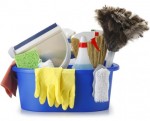Spring Cleaning Guide from Optima Properties


Do not read this list and become overwhelmed, it is an extensive list meant to cover basic home maintenance. Not all of these maintenance items will apply to all homes. This is a comprehensive guideline designed for homes in the South as well as Northern climates.
Spring cleaning is a way to demonstrate pride in ownership (or rentership). A home and its contents are investments; money spent on something you really love or really need (ideally both). When you take the time to clean thoroughly and properly, you can maintain and prolong the life of the item or finish for years. Further, it means you live in a cleaner and healthier home; less dust, dust mites, allergens, odors, and dirt.
Always start from the top and work your way down. Think about it like this: dust falls down (like rain or snow) so if you start at the top, you’ll never have to re-clean a surface (which is a time waster). It doesn’t make sense to clean the floors first and then dust the tabletops; you’ll just have to clean the floors again. Use gravity to your benefit and always work from top to bottom. It also helps you not miss anything!
General Spring Cleaning Tasks:
 These are a list of some of the things that need to be done around the house, and spring is a great time to do them. So often we don’t remember to do them, so let this be your wake-up call!
These are a list of some of the things that need to be done around the house, and spring is a great time to do them. So often we don’t remember to do them, so let this be your wake-up call!
Tests and replacements:
Test smoke alarm
Test carbon monoxide alarm
Check flashlight batteries
Check fire extinguishers
Change air filters
Check all window screens for tears and repair or replace as required
Overall Spring Cleaning Chores: 
Remove fingerprints and dirt from light switches and door handles
Spring Clean Outside:










 Kim N. Bregman
Kim N. Bregman